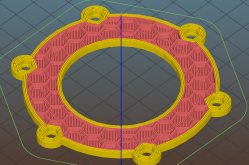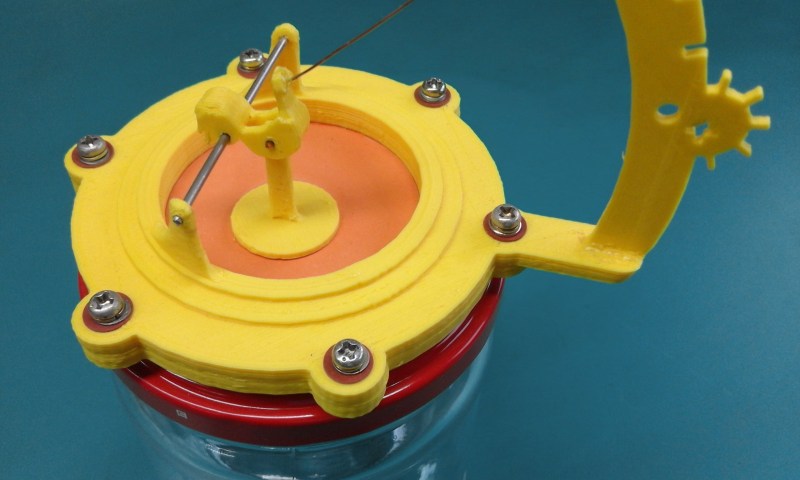[Taciuc Marius] and his colleague noticed that days with low atmospheric pressure plus caffeine in their system meant a spike in blood pressure. Considering how this might impact his cardiovascular health, he decided to make a relative pressure barometer out of a jar to help him decide whether he should really have another cup of coffee.
Aside from a 3D printer, you’ll need to assemble a small jar with a lid, some  screws, lock washers, nuts, and a flexible membrane — a piece of a rubber glove or balloon will do nicely. [Marius] details the build process on his project page, advising others to print the parts at 0.2 resolution — potentially even upping the extrusion multiplier to 1.1 — to prevent gaps in the print that would compromise the airtight seal needed for the barometer to work properly.
screws, lock washers, nuts, and a flexible membrane — a piece of a rubber glove or balloon will do nicely. [Marius] details the build process on his project page, advising others to print the parts at 0.2 resolution — potentially even upping the extrusion multiplier to 1.1 — to prevent gaps in the print that would compromise the airtight seal needed for the barometer to work properly.
Additionally, thick glue or epoxy is recommended for the rest of the assembly process — it doesn’t have to be pretty, but it does need to be sealed! The final product can be easily tested by simply holding the jar.
While this barometer helps one make healthy choices, not all are created equal. This one tells you flat out how you should consider getting to work, while others have been tricked into behaving like touch sensors.

















I wonder how you could compensate for temperature variation as well.
I remember in some Usborn book from the 80’s had a barometer like that – it wasn’t quiet as fancy. Just a jar with a balloon stretched over the opening and held on with a rubber band and a straw taped to the ballon as the pointer. Hmm maybe that was on the curiosity show?
Yah that was a bit of a classic in books of the type “Junior book of Science” or “Boys Own Science Experiments” way back into the 1920s or 1930s, soon after balloons were available I guess.
Temperature compensation is as simple as temperature regulation.
http://www.techlib.com/electronics/barometer.html
“…we realized that when we drink to much coffee in the morning and the atmospheric pressure is too low, the chances that we get a higher blood pressure are dramatically increasing. This is also true for those who suffer from heart diseases.”
Much as I applaud their effort, the premise is just plain daft* – next it will be a free-range gluten detector. Plus, solid state sensor breakouts are available from SparkFruit et al.
*https://www.ncbi.nlm.nih.gov/pubmed/12441212
What’s really “daft” is that article you sourced. The investigation of 333 people with so many variables hardly makes it a solid study. There are people (including myself) that are affected by pressure systems that we can experience anything from a slight headache to a disabling migraine.
Now the free-range gluten detector? ;) That’s another story…
i’m not into this gluten craze, the only difference for me, that i can eat more pizza, if i’m ordering it gluten free, and to be on the topic, i have low blood pressure what is triggering some migraine, so i need to drink coffee :)
Any solid state sensor breakout board will stand only if we apply the principle “why make it simple when you can make it complicated”. Otherwise, it requires electricity, a display, some electronics, maybe firmware, a case and so on.
By contrast, a glass jar with a red lead and a yellow 3D printed barometer on top looks like a really badass DIY. It has a steampunk appearance, it has the beauty of simplicity, it’s also functional, and it does its job with zero maintenance and zero power. Couldn’t ask for more.
It is well known that small changes in relative pressure cause caffeine molecules to unfold to the point that they press against the blood pressure diaphragm in the brain’s carburetor.
What if I rejet and add a larger accelerator pump?
I actually thought that the “premise” was a joke. Are you sure that it’s for real? Who needs a premise to make an old-timey barometer?
@NiHaoMike: ah techlib. Everything there is awesome.
OTOH, the BMP280 is crazy. You can read the barometric pressure difference over 10 cm reliably, and it doubles as the most accurate thermometer you own. For a few bucks. We live in the future.
But it’s still cool to reinvent the past.
Look, not everyone avoiding gluten is a tinfoil hat nutjob. I was severely malnourished for a couple years until I found out I have a particular stomach condition that makes me unable to digest gluten. I do however find it amusing when perfectly normal people buy gluten free desserts because they’re “healthier” somehow (they’re not).
Can’t say I’ve ever heard of a connection between caffeine and barometric pressure. But there’s all those other health benefits though.
What I’m getting from this is, “Move to Venus, live forever!” :-D